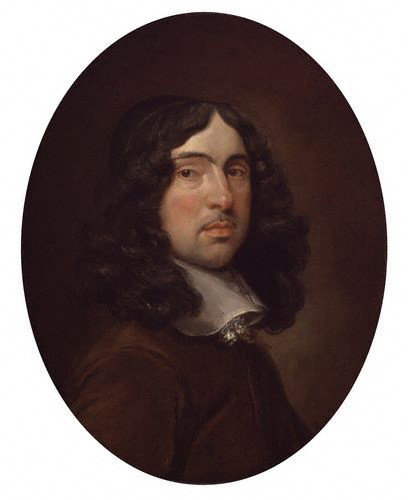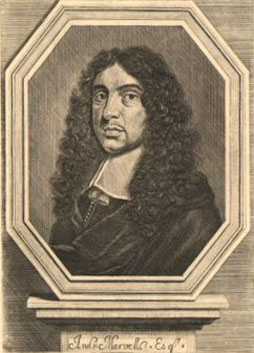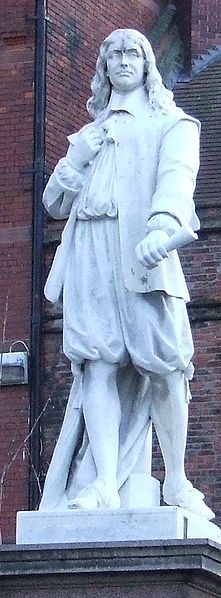<Back to Index>
- Chemist Archibald Scott Couper, 1831
- Poet Andrew Marvell, 1621
- King of France Henry II, 1519
PAGE SPONSOR



Andrew Marvell (31 March 1621 – 16 August 1678) was an English metaphysical poet, Parliamentarian, and the son of a Church of England clergyman (also named Andrew Marvell). As a metaphysical poet, he is associated with John Donne and George Herbert. He was a colleague and friend of John Milton.
Marvell was born in Winestead - in - Holderness, East Riding of Yorkshire, near the city of Kingston upon Hull. The family moved to Hull when his father was appointed Lecturer at Holy Trinity Church there, and Marvell was educated at Hull Grammar School. A secondary school in the city is now named after him.
His most famous poems include To His Coy Mistress, The Garden, An Horatian Ode upon Cromwell's Return from Ireland, and the country house poem Upon Appleton House.
At the age of twelve, Marvell attended Trinity College, Cambridge, and eventually received his BA degree. Afterwards, from the middle of 1642 onwards, Marvell probably travelled in continental Europe. He may well have served as a tutor for an aristocrat on the Grand Tour; but the facts are not clear on this point. While England was embroiled in the civil war, Marvell seems to have remained on the continent until 1647. It is not known exactly where his travels took him, except that he was in Rome in 1645 and Milton later reported that Marvell had mastered four languages, including French, Italian and Spanish.
Marvell's first poems, which were written in Latin and Greek and published when he was still at Cambridge, lamented a visitation of the plague and celebrated the birth of a child to King Charles I and Queen Henrietta Maria. He only belatedly became sympathetic to the successive regimes during the Interregnum after Charles I's execution, which took place 30 January 1649. His Horatian Ode, a political poem dated to early 1650, responds with sorrow to the regicide even as it praises Oliver Cromwell's return from Ireland.
Circa 1650 - 52, Marvell served as tutor to the daughter of the Lord General Thomas Fairfax, who had recently relinquished command of the Parliamentary army to Cromwell. He lived during that time at Nun Appleton House, near York, where he continued to write poetry. One poem, Upon Appleton House, To My Lord Fairfax,
uses a description of the estate as a way of exploring Fairfax's and
Marvell's own situation in a time of war and political change. Probably
the best known poem he wrote at this time was To His Coy Mistress.
During the period of increasing tensions leading up to the First Anglo - Dutch War of 1653, Marvell wrote the satirical "Character of Holland," repeating the then current stereotype of the Dutch as "drunken and profane": "This indigested vomit of the Sea,/ Fell to the Dutch by Just Propriety".
He became a tutor to Cromwell’s ward, William Dutton, in 1653, and moved to live with his pupil at the house of John Oxenbridge in Eton. Oxenbridge had made two trips to Bermuda, and it is thought that this inspired Marvell to write his poem Bermudas. He also wrote several poems in praise of Cromwell, who was by this time Lord Protector of England. In 1656 Marvell and Dutton travelled to France, to visit the Protestant Academy of Saumur.
In 1657, Marvell joined Milton, who by that time had lost his sight, in service as Latin secretary to Cromwell's Council of State at a salary of Ł200 a year, which represented financial security at that time. In 1659 he was elected to Parliament from his birthplace of Hull in Yorkshire,
and was paid a rate of 6 shillings, 8 pence per day during sittings of
parliament, a financial support derived from the contributions of his
constituency. This
was a post Marvell soon lost in the changes that occurred to parliament
in 1659, only to regain it in 1660, whereafter he held it until his
death.
Oliver Cromwell died in 1658. He was succeeded as Lord Protector by his son Richard, but in 1660 the monarchy was restored to Charles II. Marvell eventually came to write several long and bitterly satirical verses against the corruption of the court. Although they circulated in manuscript form, and some found anonymous publication in print, they were too politically sensitive and thus dangerous to be published under his name until well after his death. He avoided punishment for his own cooperation with republicanism, while he helped convince the government of Charles II not to execute John Milton for his antimonarchical writings and revolutionary activities. The closeness of the relationship between the two former office mates is indicated by the fact that Marvell contributed an eloquent prefatory poem to the second edition of Milton's famous epic Paradise Lost. According to a biographer:
| “ | Skilled in the arts of self - preservation, he was not a toady. | ” |
Marvell took up opposition to the 'court party', and satirised them anonymously. In his longest verse satire, Last Instructions to a Painter, written in 1667, Marvell responded to the political corruption that had contributed to English failures during the Second Anglo - Dutch War. The poem did not find print publication until after the Revolution of 1688 - 9. The poem instructs an imaginary painter how to picture the state without a proper navy to defend them, led by men without intelligence or courage, a corrupt and dissolute court, and dishonest officials. Of another such satire, Samuel Pepys, himself a government official, commented in hisdiary, "Here I met with a fourth Advice to a Painter upon the coming in of the Dutch and the End of the War, that made my heart ake to read, it being too sharp and so true."
From
1659 until his death in 1678, Marvell was a conscientious member of
Parliament, steadily reporting on parliamentary and national business
to his constituency and serving as London agent for the Hull Trinity House, a shipmasters' guild. He went on two missions to the continent, one to Holland and the other encompassing Russia, Sweden, and Denmark.
Marvell also wrote anonymous prose satires criticizing the monarchy and Catholicism, defending Puritan dissenters, and denouncing censorship.
The Rehearsal Transpros'd, an attack on Samuel Parker, was published in two parts in 1672 and 1673.
In 1676, Mr. Smirke; or The Divine in Mode, a work critical of intolerance within the Church of England, was published together with a "Short Historical Essay, concerning General Councils, Creeds, and Impositions, in matters of Religion."
Marvell's pamphlet An Account of the Growth of Popery and Arbitrary Government in England, published in late 1677, claimed that:
John Kenyon described it as "one of the most influential pamphlets of the decade" and G.M. Trevelyan called it: "A fine pamphlet, which throws light on causes provocative of the formation of the Whig party".
A 1678 work published anonymously ("by a Protestant") in defense of John Howe against the attack of his fellow - dissenter, the severe Calvinist Thomas Danson, is also probably by Marvell. Its full title is Remarks upon a late disingenuous discourse, writ by one T.D. under the pretence de causa Dei, and of answering Mr. John Howe's letter and postscript of God's prescience, &c., affirming, as the Protestant docrine, that GOd doth by efficacious influence universally move and determine men to all their actions, even to those that are most wicked.
Although Marvell became a Parliamentarian, he was not a Puritan. He had flirted briefly with Catholicism as a youth, and was described in his thirties (on the Saumur visit) as "a notable English Italo - Machiavellian". During his lifetime, his prose satires were much better known than his verse.
Vincent Palmieri noted that Marvell is sometimes known as the "British Aristides" for his incorruptible integrity in life and poverty at
death. Many of his poems were not published until 1681, three years
after his death, from a collection owned by Mary Palmer, his
housekeeper. After Marvell's death she laid dubious claim to having
been his wife, from the time of a secret marriage in 1667.
Others were written in the pastoral style of the classical Roman authors. Even here, Marvell tends to place a particular picture before us. In The Nymph Complaining for the Death of her Fawn, the nymph weeps for the little animal as it dies, and tells us how it consoled her for her betrayal in love.
His pastoral poems, including Upon Appleton House achieve originality and a unique tone through his reworking and subversion of the pastoral genre.